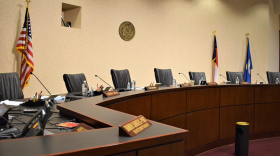The House Select Committee on Education Reform voted Monday to ask North Carolina lawmakers to incorporate new measures into its A-to-F school performance grades.
The grades are currently based on student performance on state reading, math and science exams, as well as graduation rates and additional exams for high schools. Critics, including educators and lawmakers from both parties, have long said those grades say more about the advantages or disadvantages students arrive with than the quality of education provided.
Last month state Superintendent Catherine Truitt presented the House panel with a plan for switching to four grades for each school, reflecting proficiency and student progress on exams, preparation for success after high school and other factors that promote or deter learning, such as extracurricular activities and chronic absenteeism.
The report to the General Assembly approved Monday calls for incorporating the new factors but combining the results into one school grade. It does not get into how much each factor should be weighted.
The 15-minute meeting didn’t generate detailed discussion, but three panel members talked about the importance of recognizing chronic absenteeism. Rep. Maria Cervania, a Wake County Democrat, cited a rate of 31%, saying that’s “very high and very concerning.” That’s the statewide rate reported in a recent AP study of post-pandemic absences, based on 2021-22 data.
Committee Co-Chair Brian Biggs, a Randolph County Republican, agreed: “It’s tough sometimes, when you have a school system and children are not attending school but your staff is being graded on their performance when they’re not there and it’s impossible to teach them.”
Rep. Hugh Blackwell, a Burke County Republican, said he wants to know more about the difference in absentee rates among districts. “Maybe we can look at what’s the explanation,” he said. “Is it a difference in policy? Is it a difference in their student population or demographics? Low-income vs. something else?”
The report offers no specific recommendations on teacher and principal compensation, upgrading technology, addressing pandemic learning loss and improving high school math scores. It simply urges the General Assembly to keep looking at ways to address those issues.
Co-Chair John Torbett, a Gaston County Republican, said he hopes the committee reconvenes to go deeper before the 2025 session, when lawmakers will approve a new two-year budget. He said he’s “looking forward to getting through a short session, getting back in committee here and doing some long-range planning for the next long session.”







